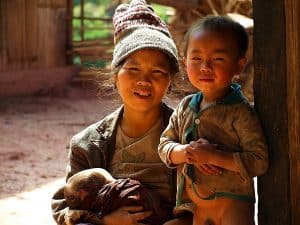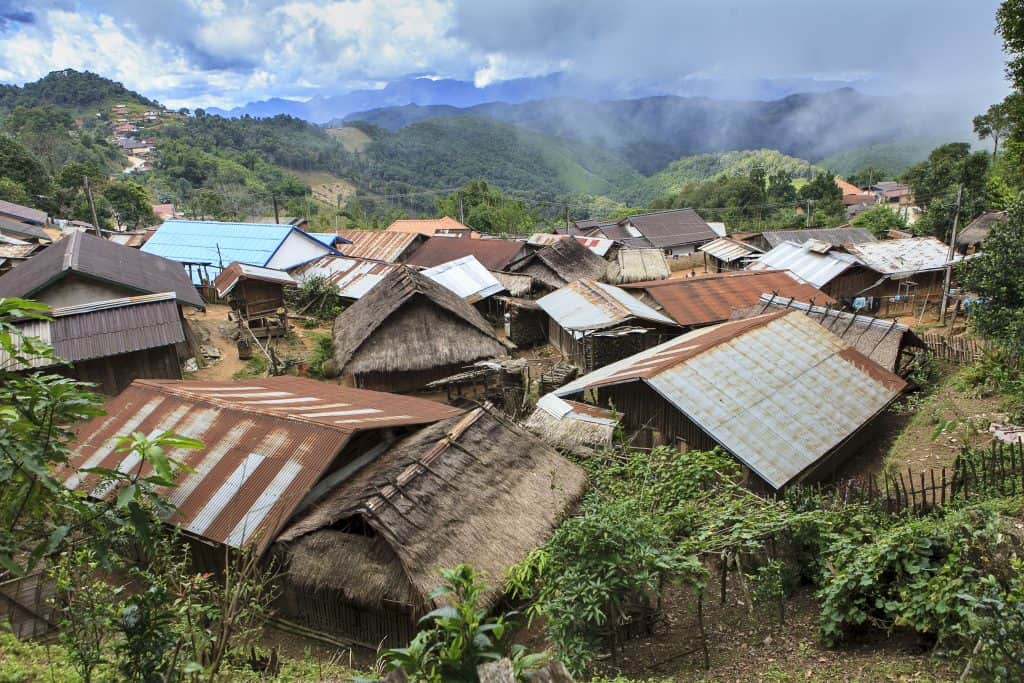By Melody Kemp

Asbestos resembles polio. Just when you think it’s beaten, it returns like some ghoul. If you think this is overly dramatic, last year Laos was struck by a polio outbreak. This year we learned that Laos now ranks amongst the globe’s major importers of asbestos. And it’s driven by cynical market forces targeting poorer nations, inadvertently promoted by international aid.
Fake News and Propaganda
Like climate change deniers, vendors of this old but persistent carcinogen are rising like punch-drunk boxers, swinging wildly at scientists and the health establishment ahead of the Rotterdam Convention negotiations, trying to win a battle that everyone thought had been won by reason and humanity. The battle is littered with fake experts like “the renowned Swiss medical toxicologist Dr. David Bernstein (sic),” a man in the pay of the Brazilian abestos industry. According to New Matilda, there are even industrial spies.
The asbestos industry still makes enough money to fly government officials to their mines in Russia, Kazakhstan, Canada and, possibly, Brazil to demonstrate the innocuousness of the product. But true believers are everywhere. A week ago over dinner in Vientiane, a Canadian public health expert assured me that asbestos is safe and vital for Canadian heating systems. Nothing else would do.
Australian trade union aid agency APHEDA has been leading the anti-asbestos movement in Asia. Phillip Hazleton, APHEDA’s Mekong region representative, spoke to me in Vientiane recently.
“In 2013 Lao imported 8000 tonnes of chrysotile but the figure may be closer to 12,000 tonnes. In 2010 it was only 3000 tonnes of raw asbestos. Laos is not known for its scrupulous import records. But what is clear is that while India and China may be greater net importers, Lao imports more per capita than anywhere else.
Interestingly Thailand and Vietnam have banned asbestos. They have created the example as they are both close political neighbours. So, the LFTU (Lao Federation of Trade Unions; part of the Lao Government apparatus) is also expressing concern. I was frankly surprised at how enthusiastic people were about doing something. Even the local media turned up in force.” (emphasis added)
Worker Exposure
In Vietnam in 2003, I witnessed young men climbing ladders dressed in jeans and tee- shirts with sacks labelled ‘Asbestos: Kazakhstan’ on their shoulders. They emptied the raw mineral into hoppers, their faces disappearing into the white haze that followed. Handkerchiefs over their nose and mouth was their only protection. This same scene is now repeated in Lao processing factories. Sometimes, Hazleton said it’s children with their heads in the clouds.
In Lao there are now sixteen processing factories, three of which are in the province of Luang Prabang famed for its world heritage city of golden temples. The city’s potential has attracted many foreign residents who would not be pleased to know their children may be playing in contaminated air. Lao’s air quality indicators have been steadily declining to a point where ironically Laos compares badly to Kazakhstan. As the climate changes and storms become more violent, more airborne dust is generated.
Roofing
Development agencies have nominated palm or grass roofing to as an indicator of poverty. These indicators are based more on Western values of income or aesthetic parameters rather than autonomy or influence. Solid roofs have now become desirable, signalling that local government is doing its job in, supposedly, improving living standards. Ceramic tiles and iron are expensive, and asbestos provides a low cost alternative. It all makes sense until one considers that upland people have the worst health indicators, complex exposures to both agrichemicals and public health risks such as respiratory problems due to the burning of rice stubble and forests, anaemia, polio, dental issues, parasitic infections.

Upland people are less likely to seal the roof or keep it in good condition. Many have to relocate to make way for infrastructure projects or to find more arable land, so asbestos is left to degrade. They also have less access to health facilities so are more likely to rely on herbal remedies and shamanism. As asbestos-related cancer rates are calculated by annual per capita use of 1.2 kgs per annum, relative risk would be concentrated amongst the poor.
Regional and International Lobbying
Regardless of the lobbying by many social and safety advocates 75% of Asian nations have still not banned asbestos. As New Matilda revealed, in an important series of controversial articles, the industry is fighting back with plants and misinformation. There is no doubt asbestos remains readily and openly on the market.
As workers throughout greater Asia organise to have absestos universally banned at the next Rotterdam meeting, it is hoped that Lao’s repressive political apparatus can be relaxed enough to allow Lao’s concerns to be put forward. There is no doubt that elites benefit from its importation just as they benefit from the dangerous agrichemicals proliferating in the nominally Communist nation. How they protect workers and the public without cutting nefarious forms of income to the ruling elite is an ever present conundrum for concerned and educated Lao.
Occupational health and safety is not part of mainstream aid activities despite the need. Rotterdam is an important and major opportunity for change but may become known as much for its theatrics as for its outcome.
Melody Kemp
Another recent asbestos article by Melody Kemp – http://apjjf.org/-Melody-Kemp/3332/article.html
Melody Kemp is an Australia safety advocate, writer and educator who has resided in Laos for many years. She is the author of Working For Life – an OHS sourcebook for women and has written previously for SafetyAtWorkBlog, and an earlier magazine version of the blog, on issues including:
